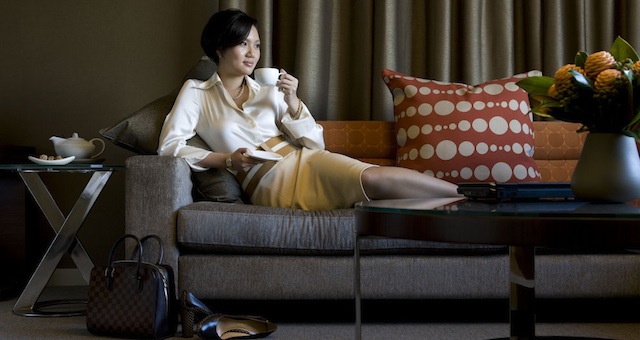A new survey by Accor’s upscale Pullman brand, in conjunction with research institute IPSOS, has revealed that Australians are more likely to use the internet for online banking as opposed to visiting online dating sites during work hours.
The majority of Aussie respondents cited their need to take a break during the day to relax as the main reason for using the internet at work for personal activity.
“Blurring”, or the gradual intermingling of professional and personal activities, is a global trend, which has transformed how travellers organise their private and work lives, right around the globe.
As a brand that targets today’s ‘bleisure traveler’ and prides itself on helping guests stay connected to both their workplace and loved ones, Pullman wanted to measure “the degree to which work encroaches on the personal lives of seasoned travellers and vice versa”, according to Accor.
In conjunction with IPSOS, Pullman surveyed 2,200 seasoned international travellers across Australia, Brazil, China, France, Germany, the UK and USA producing some insightful results.
For Aussies, the survey’s key findings reveal that:
-Compared to the worldwide average of 77%, 80% of Australian’s keenly watch their dollars while at work using the internet to check their bank accounts;
-Whilst only 8% of Australian’s confess to using the internet to visit dating sites during work hours, a staggering 60% of Chinese respondents were on the hunt for their next online match at work;
-Instead of a good night kiss, for 47% of Australians the last thing they do before going to sleep is check their emails;
-63% of the Australian travelers surveyed believe mobile devices help their career development; and
-50% of Australians bring their professional devices on holiday – while only 39% of Brits do.
“Our knowledge of seasoned international travellers has led us to observe various trends over the years,” said Accor’s SVP of Global Marketing for Pullman, Xavier Louyot.
“Our hotel offer has evolved to anticipate these changes and meet the expectations of this new generation of curious, cosmopolitan, hyper-connected travelers who travel both for business and leisure.
“The results of this survey confirm our vision of upscale international hospitality which is based on the ‘work-hard, play-hard’ philosophy and reflects our customer’s lifestyle,” he said.
Hyper-equipped, free and efficient global travellers
It seems that ‘emerging’ nations such as Brazil and China are most eager to take up new technology and integrate their professional and personal lives more fully.
79% of Chinese and 71% of Brazilians surveyed have at least one mobile professional device (compared with an average of 60% in the other countries). During a week-long holiday, 14% of Chinese respondents said they spend at least 1-2 days on their professional devices, while only 5% of Australians and 8% of Germans allowed work to encroach on their annual leave so much.
At the other extreme, our personal activities are increasingly encroaching on our working lives, with most respondents saying it is acceptable to handle private activities during work hours simply because they also work when they are at home.
However, there are differences in the types of personal behavior that different nationalities think acceptable: for example, the Americans are among the most likely to spend work time shopping online with 68% saying this was a regular activity. While 68% of Aussie’s prefer to spend time planning and booking their next holiday.
The Chinese are the least likely to switch off during what should be personal time – 65% of Chinese respondents said they check their professional devices during private meals; while only 34% of Australians and 36% of French would do so. Interestingly, Australians proved the most forgiving of their partner’s use of social media during personal time with only 22% saying they had been rebuked by their partner for such behavior, while the Brazilians are most likely to complain at 61%.


